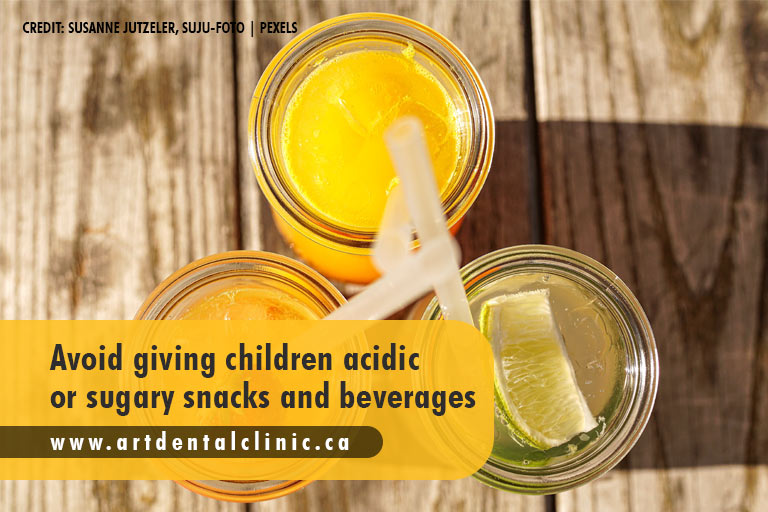Don’t underestimate the importance of baby teeth! From teething pain to dental hygiene, there is a lot of essential information that you, as a parent, need to know.
Let us help you out with this comprehensive guide — so you can ensure your baby’s teeth are healthy and strong.
The Basics of Baby Teeth
Baby teeth are essential for more than just looking cute — they are essential to your baby’s health and proper development.
Baby teeth hold spaces in the jaw for permanent adult teeth, help with proper speech development, aid in chewing and eating, and support a child’s facial muscles.
Baby teeth should start to come in around 6 months, and by age 3 or 4, all 20 baby teeth should be present.
The Importance of Proper Dental Care

Understanding the importance of proper dental care for babies and young children is important. To keep these essential tools healthy, here are the basics of baby teeth care:
- Start brushing your baby’s teeth at least twice daily with a soft toothbrush and water as soon as they come in.
- Help your child learn how to brush their teeth while still supervising until they are around 8 years old
- Visit the dentist within 6 months after his/her first tooth appears or by their first birthday
- Remind your child to avoid sugary juices and drinks; offer them water instead
- Make sure to floss between all visible surfaces of your child’s newly coming into contact with each other when 2 adjacent baby teeth erupt
- Limit snacks to only nutritious options like whole grains, fruits, vegetables, and dairy products
- Monitor mouth injuries like falls or other trauma from any kind of play that could cause severe damage to an infant’s fragile primary dentition
What to Do About Teething
Teething is a natural process of developing and growing your baby’s first set of teeth. This normally starts as early as 6 months and may last for several weeks to months.
Common signs that your baby may be teething include restlessness, irritability, swollen or tender gums, and increased drooling. Additionally, babies may chew on objects to try to alleviate the discomfort associated with teething.
When teething, some common treatments parents can use to ease their babies’ discomfort include giving their child a firm rubber surface (such as a cold washcloth or chilled teether) for them to chew on or having them suck on something cold, such as a cooled pacifier or frozen fruit puree.
Additionally, you can give your child ibuprofen (if they are over 6 months old) or topical medications such as Orajel specifically designed for children treated for teething pain.
It is important to remember never to put aspirin in your baby’s mouth; it can be very dangerous! However, if the pain persists despite these remedies, contact your dentist.
The Role of Diet in Baby Teeth

Diet plays an important role in the health of a child’s developing teeth, so parents need to understand what nutritional requirements should be met for their baby’s oral health.
The American Academy of Pediatric Dentistry recommends that children under 2 not consume carbonated beverages (including juice) and sugary snacks.
Babies between 4 months and one year old should be given milk or formula as their primary source of nutrition.
Parents should limit infants’ and toddlers’ intake of starchy foods, like potato chips and French fries, which can lead to high levels of tooth decay due to their ability to stick to the enamel on baby teeth.
On top of that, some fruits high in acidity, such as lemons and oranges, may erode enamel if consumed too often.
Foods with natural sugars, like fruits and vegetables or plain yogurt, provide essential vitamins and minerals for developing babies without excessive sugar consumption, which can lead to cavities.
Encouraging healthy eating patterns early on can help ensure a lifetime of healthy smiles for babies — so ensuring your child eats nutritious foods early can help ward off cavities later on!
When to Visit the Dentist
Visiting the dentist when your baby is young can help ensure the highest oral health level for their primary teeth. Even though baby teeth are replaced, they still require preventive treatment.
The American Academy of Pediatrics (AAP) recommends that your child visit a pediatric dentist within 6 months of their first tooth coming in or by age one year old. Your child should continue to see the dentist regularly throughout their childhood and early adolescence.
Visiting a pediatric dentist can provide you with valuable information on proper dental care practices and preventative steps you can take at home, such as brushing and flossing, proper nutrition, and avoiding sugary foods.
It’s also important to recognize potential issues, such as early decay or crowding, so that solutions like sealants can be applied if necessary.
The AAP recommends regular checkups every six months after one year to keep up with your child’s dental development.
Wrapping Up
Baby teeth may be temporary, but they play a crucial role in your child’s development and can affect their oral health for years. By following the tips outlined in this blog post, you can help ensure your child’s baby teeth stay healthy and strong.
Remember to start dental care early, maintain good oral hygiene habits, monitor your child’s diet, and schedule regular visits with a pediatric dentist. Doing so can help set your child up for a lifetime of healthy teeth and gums.
If you’re looking for a dentist in Waterloo who has experience with pediatrics, Art Dental Clinic is here to help. Contact us today at (519) 747-9797!

